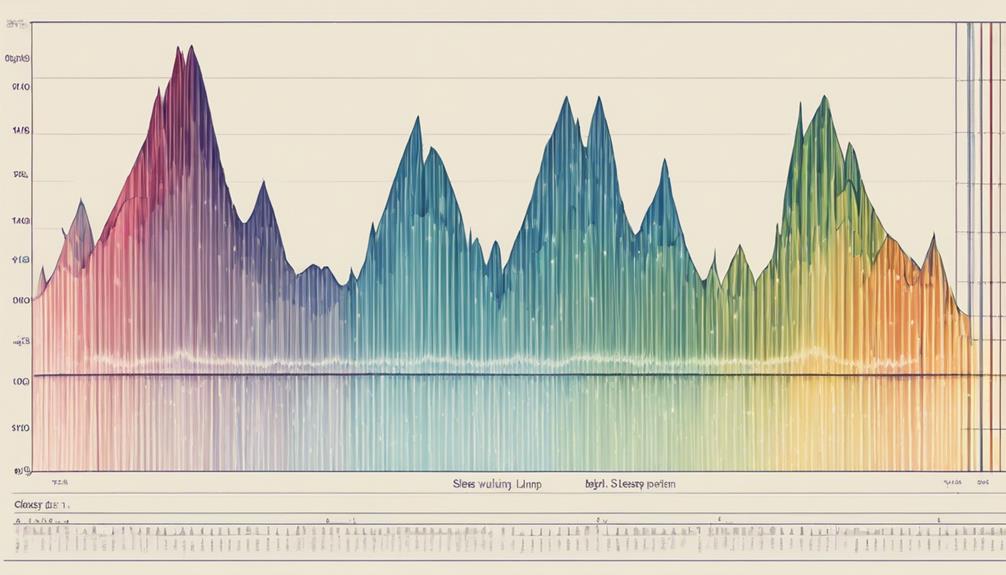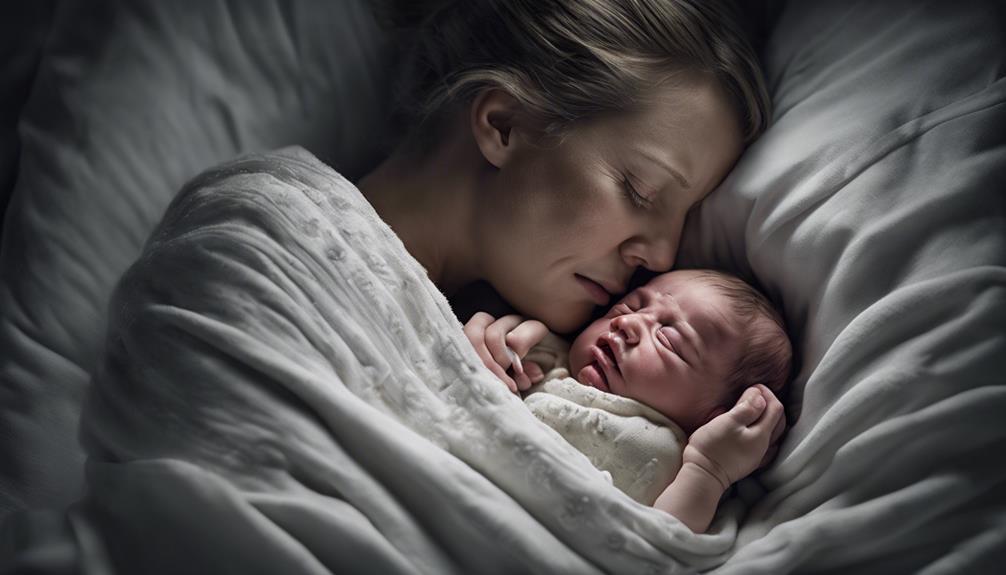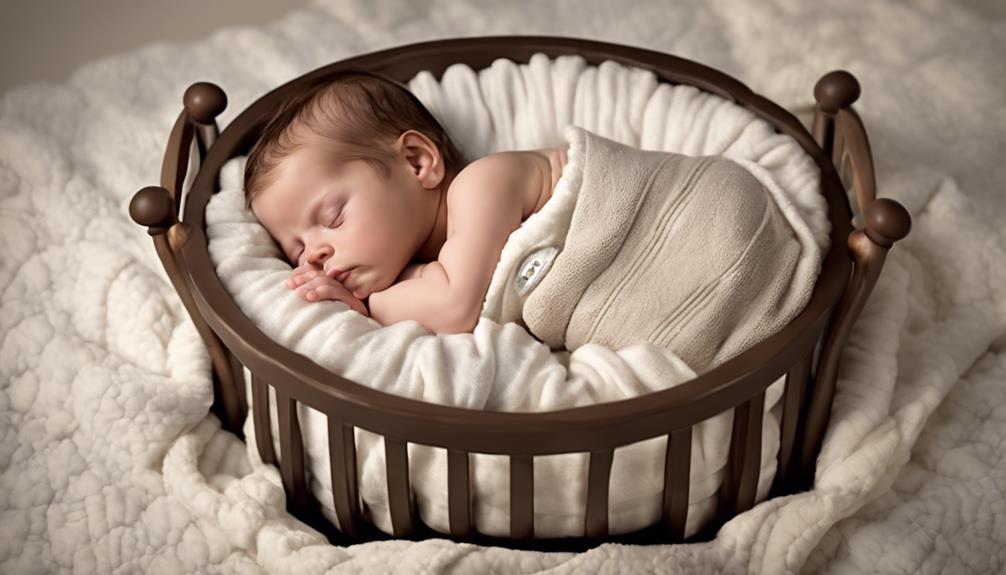As parents, the hesitation that often comes with exploring the world of newborn sleep patterns is familiar. However, when it comes to decoding those mysterious sleep jumps, having a complete guide can make all the difference.
By uncovering the underlying causes and learning effective coping strategies, you can gain valuable insights into your baby's sleep behaviors. Stay tuned to discover how grasping these sleep jumps can lead to a more restful and peaceful experience for both you and your little one.
Key Takeaways
- Newborns cycle through REM and deep sleep every 50-60 minutes for brain development.
- Sleep jumps are triggered by growth spurts, milestones, and changes in sleep patterns.
- Recognize patterns around 2 weeks, 4 months, and 9 months for anticipating needs.
- Coping strategies include consistent routines, soothing environments, and extra comfort during jumps.
Sleep Jump Basics
Exploring the world of sleep jumps with your newborn can be challenging, but understanding the basics can make a big difference in how you support your little one through these periods of increased wakefulness and fussiness. Newborns' sleep patterns are quite different from those of adults. They cycle through REM (rapid eye movement) sleep and deep sleep in shorter intervals, around 50 to 60 minutes. This means they may wake up often, cry loudly, or have trouble settling back to sleep. These sleep cycles are essential for their brain development and overall well-being.
During growth spurts, babies may experience more frequent sleep jumps, causing them to be awake and taking shorter naps. Establishing a bedtime routine can help signal to your baby that it's time to wind down. Remember, these phases are temporary, and with patience and a consistent approach, you can navigate through them together.
Causes of Sleep Jumps

Understanding the various causes behind newborn sleep jumps is essential for parents to effectively support their little ones through these periods of increased wakefulness and fussiness. Sleep jumps in newborns can be triggered by growth spurts, developmental milestones, and changes in sleep patterns. Growth spurts may lead to increased hunger and disrupted sleep, resulting in more frequent wake-ups during the night. Similarly, developmental milestones like rolling over or sitting up can impact a baby's sleep routine, causing sleep jumps as they adjust to these new skills. Changes in sleep patterns, such as moving between sleep cycles, can also lead to temporary disruptions in a newborn's sleep. By recognizing these factors, parents can anticipate and respond to their baby's changing sleep needs effectively, providing comfort and reassurance during these challenging times. Below is a table summarizing the causes of sleep jumps in newborns:
| Causes of Sleep Jumps |
|---|
| Growth Spurts |
| Developmental Milestones |
| Changes in Sleep Patterns |
Recognizing Sleep Jump Patterns

Traversing through your baby's sleep journey involves recognizing patterns of sleep jumps that can occur at specific ages, such as 2 weeks, 8 weeks, 4 months, 6 months, and 9 months, bringing changes in their sleep routines and behaviors. These sleep jumps often coincide with developmental milestones like growth spurts and cognitive advancements, leading to temporary disruptions in your baby's sleep patterns. During these times, you may notice more frequent night wakings or shorter naps as your little one navigates through these developmental leaps.
Understanding these sleep jump patterns can help you anticipate and respond effectively to your baby's changing needs. Providing comfort, maintaining consistent routines, and adjusting sleep strategies can all play a crucial role in helping your baby through these shifts. By recognizing these shifts in your baby's sleep, you can create a supportive environment that promotes better rest for both your little one and yourself. Stay tuned for practical coping strategies in the upcoming section to help you navigate through these sleep jumps with confidence.
Coping Strategies for Sleep Jumps

During these challenging times of sleep jumps, establishing a consistent bedtime routine is important to support your baby's adjustment. Creating a predictable sequence of activities before bedtime can signal to your little one that it's time to wind down.
Incorporating white noise or gentle music can help drown out disruptive sounds and create a soothing environment conducive to sleep. Make sure your baby's sleep space is comfortable by regulating the room temperature and minimizing disturbances that could interrupt their rest.
Remember to stay patient and provide extra comfort and reassurance during these periods of sleep jumps. If you find yourself struggling to cope, don't hesitate to reach out to healthcare providers or parenting resources for guidance on managing sleep jumps effectively.
You're not alone in this journey, and seeking support can make a significant difference in how you navigate through these challenging phases of newborn sleep.
Promoting Healthy Sleep Habits

To cultivate healthy sleep habits in your newborn, prioritize establishing a consistent bedtime routine that supports their natural sleep patterns. Creating a calm environment for bedtime, such as dimming lights and reducing noise levels, can help signal to your baby that it's time to wind down.
Responding promptly to your baby's sleep cues, like rubbing their eyes or yawning, can aid in developing their self-soothing skills. Remember, seeking guidance from healthcare professionals is essential if persistent sleep issues arise, as they can provide valuable insight and support.
When considering sleep training methods, options like the Ferber Method or the Chair Method have been effective for many parents in establishing good sleep habits for babies. By being attentive to your baby's needs and consistently implementing a bedtime routine, you can help promote healthy sleep patterns that benefit both your little one and your family.
Frequently Asked Questions
Why Do Newborns Jump in Their Sleep?
When newborns jump in their sleep, it's often due to the Moro reflex, a startle response to sudden stimuli. It's a normal part of their development, usually happening in the first 5 months.
What Is the Hardest Week With a Newborn?
The hardest week with a newborn is typically around the 6-week mark. Babies may be more irritable, clingy, and have increased feeding demands. Sleep regression can occur, leading to disrupted sleep patterns. We empathize with the challenges and offer support.
Why Is Week 6 the Hardest Newborn?
Week 6 is like a marathon for newborns – relentless crying, constant feeding, and unpredictable sleep. We feel overwhelmed with their demands, but understanding this phase helps us provide the extra TLC they need.
What Is the Hardest Age for a Baby?
We found that the hardest age for a baby is around 4 months due to sleep regressions and developmental leaps. This stage brings more night awakenings and fussy behaviors. Understanding and supporting babies during this time is important for establishing healthy sleep routines.
Conclusion
To sum up, managing newborn sleep jumps can feel like riding a rollercoaster of emotions and exhaustion. Remember, just like a caterpillar must go through its stages to become a butterfly, your baby is also growing and changing through these sleep jumps.
By staying patient, flexible, and consistent, you can help your little one soar to new heights of restful sleep. Embrace the journey and trust that smoother nights are just around the corner.









